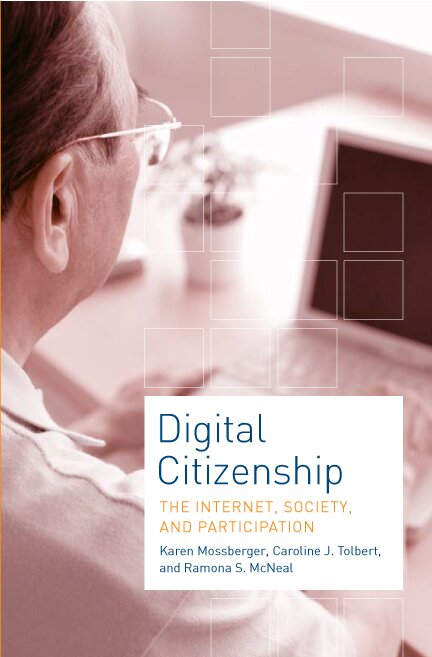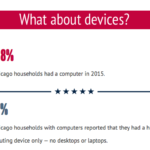One of our programs is Connect Chicago, a loose network of more than 250 places where you can use a computer for free. It is a central part of our work around both access to the Internet and digital skills.
I also serve as the chair the of the Eliminate the Digital Divide Advisory Committee of the State of Illinois Department of Commerce and Economic Development Eliminate the Digital Divide Grant Program.
In measuring the impact of the work of Connect Chicago members, we spend a lot of time gathering research. Here’s a look at some of the publications we look to for guidance.

Digital Citizenship: The-Internet society and Participation
In Digital Citizenship: The Internet, Society, and Participation, Karen Mossberger shows that disconnected communities have lower rates of employment, which exacerbates labor market inequalities. Residents who use a computer at work earn 14.5% more than those who do not. Those who use the Internet at work earn 17% more. These advantages matter even more for the less educated and people of color, with an 18% increase for less educated African American men and a 16-17% increase for less educated Latino women and men: http://www.amazon.com/Digital-Citizenship-Internet-Society-Participation/dp/0262633531

Smart Communities Evaluation Family Net Centers
Smart Communities Evaluation: FamilyNet Centers, by Karen Mossberger, Ph.D., and others, April, 2014: https://cpi.asu.edu/sites/default/files/smartcommunities_familynetcenters_0.pdf. Residents of Smart Communities were 9% more likely to use the Internet and to become broadband subscribers as a result of training and outreach, and over 33,000 households in the five demonstration Smart Communities became new broadband subscribers. Beneficiaries of Smart Communities programs are 13% more likely to obtain employment or increase their net income when technology training is combined with other support services

Measuring Change in Internet Use and Adoption
Measuring Change in Internet Use and Broadband Adoption, Karen Mossberger, April 2014: https://cpi.asu.edu/sites/default/files/smartcommunities_measuringinternetchangeinchicago_0.pdf. “On average, the increase in both broadband at home and Internet use anywhere in the Smart Communities appears to be 4 percentage points higher than in other Chicago community areas”.

Measuring Digital Citizenship: Mobile Access and Broadband
“Measuring Digital Citizenship: Mobile Access and Broadband”: http://ijoc.org/index.php/ijoc/article/viewFile/1777/808. “Based on a 2011 survey in Chicago, we find more mobile phone adoption among Blacks than among non-Hispanic Whites, and greater likelihood of Internet use for job searches among residents who rely primarily on smartphones to go online than among home broadband adopters. Yet our analysis also shows that broadband at home remains critically important for digital citizenship, and that the growth in mobile phone use.

City of Chicago Technology Plan
City of Chicago Technology Plan, September 2013, http://techplan.cityofchicago.org/. The plan charts a “course to realize Chicago’s potential as a city where technology fuels opportunity, inclusion, engagement, and innovation for all.and use.”

Plan for Economic Growth and Jobs
World Business Chicago Plan for Jobs and Economic Growth, March 2012, http://www.worldbusinesschicago.com/plan. The Plan calls for a strategy to “develop and deploy assets in neighborhoods to align with regional economic growth”

Chicago’s Business Climate
Chicago Business Climate: http://www.worldbusinesschicago.com/files/data/Chicago-Business-Climate_0.pdf. The Gross Regional Product is $530 billion, which grows with increased digital skills. See also: “Business Climate” page on World Business Chicago website: http://www.worldbusinesschicago.com/data/chicago-business-overview

Informatics Moments
Informatics Moments: deep study of the CyberNavigator program. “This article examines the informatics moment in people’s everyday lives as they sought help at a branch public library“: http://people.lis.illinois.edu/~katewill/work/23-williams-2012-informatics-moments.pdf.

A Platform for Participation
and Innovation
“A Platform for Participation and Innovation: Smart Communities in Chicago Master Plan”: http://www.lisc-chicago.org/uploads/lisc-chicago/documents/scpmasterplan.pdf. Great detail on this ambitious and successful program.

The City That Networks
“The City that NETWorks: Transforming Society and Economy Through Digital Excellence”: http://www.cityofchicago.org/dam/city/depts/doit/supp_info/DEI/CityThatNetworks.pdf. The MacArthur Foundation has been a national leader in digital excellence since it began focusing on the Digital Divide in the early 2000s. This report created the conceptual models for both Smart Communities, as a demonstration program, and Smart Chicago, as a center of gravity for investments around digital excellence.

City Colleges FY2014 Approved Budget Book
City Colleges of Chicago, Budget Book 2014, Annual Operating Budget, http://www.ccc.edu/departments/Documents/Finance Documents/FY2014-ApprovedBudgetBook.pdf. City college supports public computer centers at 12 locations across the city, providing key access points for residents in some of the highest-quality higher education in neighborhoods: http://locations.weconnectchicago.org/#/?view_mode=map&filter_type=City%20Colleges%20of%20Chicago.

How Americans Value Public
Libraries in Their Communities
How Americans Value Public Libraries in Their Communities, Pew Research Center, http://libraries.pewinternet.org/2013/12/11/libraries-in-communities/: “Americans strongly value the role of public libraries in their communities, both for providing access to materials and resources and for promoting literacy and improving the overall quality of life. Most Americans say they have only had positive experiences at public libraries, and value a range of library resources and services.”

Who’s Not Online And Why
Who’s Not Online and Why: 15% of American adults do not use the internet at all, and another 9% of adults use the internet but not at home, September 2013: http://www.pewinternet.org/2013/09/25/whos-not-online-and-why/. See also a regularly updated graphic: Pew Research Internet Project “Offline Adults”: http://www.pewinternet.org/data-trend/internet-use/offline-adults/ demographic information for the 14% of American adults who do not go online.

Smartphone Adoption 2013
Smartphone Ownership — 2013 Update: http://www.pewinternet.org/2013/06/05/smartphone-ownership-2013/ 55% of cell phone owners say that their phone is a smartphone. This is relevant to our work in that we have to address the digital learning needs of mobile phone users.

Effects of Broadband Deployment on Output and Employment
Brookings Institute: The Effects of Broadband Deployment on Output and Employment, July 2007: http://www.brookings.edu/views/papers/crandall/200706litan.pdf. “For every one percentage point increase in broadband penetration in a state, employment is projected to increase by 0.2 to 0.3 percent per year”.

Economic Impacts of Broadband
The World Bank, Information and Communications for Development 2009: Extending Reach and Increasing Impact Chapter 3, Economic Impacts of Broadband: http://siteresources.worldbank.org/EXTIC4D/Resources/IC4D_Broadband_35_50.pdf. Estimates that a 10% increase in broadband penetration would yield a 1.21% and 1.38% increase in GDP growth on average for high income and low/middle-income countries, respectively.
Considering joining Connect Chicago today!






